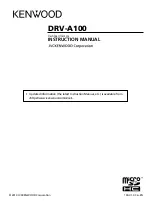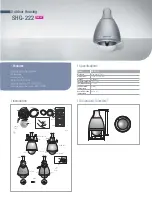
25
26
to remove debris from the microphone holes. To avoid damaging the inner
diaphragms, do not blow compressed air into the microphone holes.
• To clean the lens and its cover, wipe them with a soft cloth. If debris gets
lodged between the lens and the packing ring, remove them with water or air.
Do not insert any foreign objects around the lens.
Preventing water damage to your camera
The rubber seal that covers the inside of the body forms a watertight barrier
that protects your sports camera in wet conditions and under water. Make sure
that the rubber seal remains clean. A single hair or grain of sand can cause a
leak. After each use in salt water, rinse the outside of the body with fresh water
and dry it. Otherwise, the hinge may rust and salt may build up in the seal,
which can cause defects. To clean the seal, rinse it with fresh water and shake it
dry (wiping it with a cloth may cause lint deposits and damage the seal).
Refit the seal into the grooves of the body door.
BATTERY INFORMATION
Optimising battery life
When the battery is low, a crossed-out battery symbol appears at the bottom
left of the screen. If the battery charge reaches 0% during recording, the camera
saves the file and turns off.
Tip: It is recommended not to discharge the battery to this level.
If possible, follow these instructions to maximise battery life:
- Capture videos with lower frame rates and resolutions
- Use these settings: o Screen saver
o Automatic off
Handling and storage
The camera contains fragile parts, including the battery. It is therefore recom-
mended not to drop, disassemble, open, crush, bend, deform, inflate, pierce,
scratch, expose to microwaves, burn or repaint the camera, or insert objects
into the battery opening. Do not use the camera or battery if they have been
damaged, for example, if they are cracked, pierced or wet. If you disassemble
or pierce the battery, it may explode or catch fire. Avoid keeping your camera
and battery in excessive heat or cold. Temperatures that are too high or too low
can temporarily reduce battery life or prevent it from working properly. Avoid
sudden changes in temperature or humidity, as condensation may form inside
and outside the camera.
Disposal of the battery
Lithium-ion batteries contain recyclable materials and are considered recy-
clable. Check the legislation in force and recycling locations where you live.
FR
EN
When discarding lithium-ion batteries, cover the terminals with adhesive tape,
insulation or packaging film to prevent them from coming into contact with
other metal objects and from catching fire during transport.
TROUBLESHOOTING
« The camera does not load »
• Check that the cable is fully plugged. A red light must light up.
• Check that the battery is well inserted in its housing. If necessary, remove and
reinsert it helping you with the strip.
« The camera does not start »
• The camera may not be charged. Check that the battery is well inserted in its
housing, recharge the battery and try again.
• Press the ON/OFF button for 3 seconds.
« The video recording stops or jerks »
• Check that the SD car dis 8 GB minimum and from class 10.
• Format the SD card with the camera before using it.
« Black screen while on use »
Check the screen saver parameters.
« The recordings on the SD card are segmented »
Check the recording settings, deactivate the loops.
« Camera reset »
Remove the battery and put it back.
CUSTOMER SERVICE
T’nB is committed to providing the best service possible. To get in touch with
the T’nB Customer Service, T’nB Service, contact us at [email protected] and
04.90.42.38.38.












































